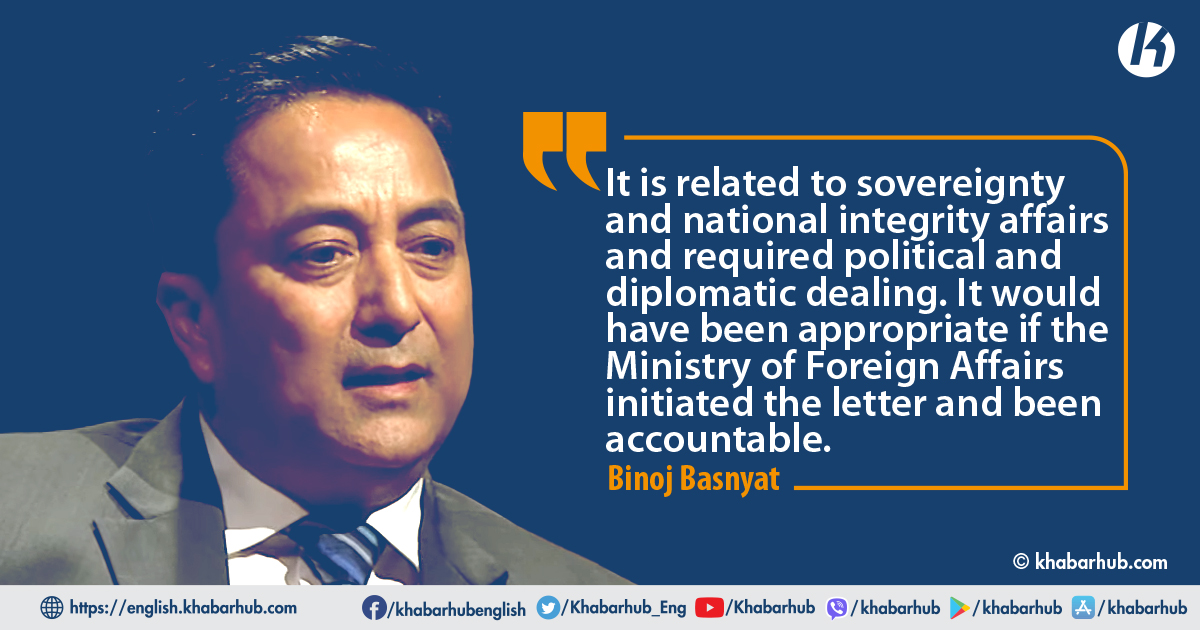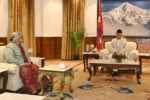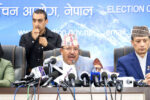As the world seems to be dealing with complex and contested geostrategic affairs, in a move to understand, adapt and strategize Nepal’s way forward- it is important to closely observe two issues related to international diplomacy.
The politicization of external affairs with the party and individual biases in a transitioning geostrategic environment, and our understanding of the Non-Alignment Policy (NAP) in a new era to assure positive multilateral engagement.
The new era of Non-Alignment Policy
In principle, non-alignment insinuates the international policy of a sovereign nation conferring that it does not align itself with any of the power blocks the Soviet-led communist or capitalist democratic America.
But at the same time keenly partakes in world affairs for the preferment of world peace, harmony and cooperation.
120 countries non-alignment movement (NAM) with 27 observers began in 1961 in Belgrade with a belief not to be of help to either the western or eastern blocs in the ‘cold war’ finding a different way to help their people, keep national independence, sovereignty, territorial integrity.
NAM is two-thirds of the United Nations and 55 percent of the world’s population. All ten nation-states of the South Asian Association for Regional Cooperation and Bay of Bengal Initiative for Multi-Sectoral Technical and Economic Cooperation are full members of NAM.
With the fall of the Berlin wall in 1989 and the collapse of the Soviet Union in 1991, global dynamics altered converging to a greater extent in the Indo-Pacific Region (IPR) from Europe.
The only superpower the US’s rivalry and competitor is China in the IPR and Russia in Europe. After Russian aggression in Ukraine, the neutral nations Finland and Sweden have requested to join NATO a military alliance with a common system of security.
Second, Russia which is the permanent member of the United Nations Security Council (UNSC) acted on its interests that curtailed Russia’s reach by the west and outwitted the principles of international laws and principles.
Concurrently on 17th June asking the serving Chief of the Army Staff General Prabhu Ram Sharma at the international committee of the House of Representatives is yet another strategic mistake it is, one, through democratic practice can be observed as a sole attempt to politicalizing contrary to democratizing the national force.
President Putin said in 2005 just after the Ukrainians launched their “orange revolution” and began to shake off Russia’s influence in the country, spurring Kyiv’s pro-democracy leanings “the collapse of the Soviet Union was the greatest geopolitical catastrophe of the century”, indicating that the “sphere of influence” that covers much of the former empire, particularly the countries that border Russia should not be part of the western values.
The US is the only superpower and China is an emerging power so the argument is the rationale of a non-alignment policy as there are no two blocks.
It does not connotate that NAM is dead it still subsists and will surely be a valuable intergovernmental tool in the long-term if so conversed ‘cold war 2.0’ stride out between China and the US.
Minister for External Affairs S Jaishankar said on 29th May in Guwahati that India has been able to maintain its policy of non-alignment in the polarized global scenario by being clear about its own interests and confident in pursuing it.
On 12th June Visakhapatnam Jaishankar said that there is no non-alignment policy now since there are no two superpowers referring to the change in India’s foreign policy contradicting his own statement.
The role of diplomacy is very important when the world is polarizing and South Asia is divided which could particularly be observed at the global forum UNSC voting for, against, neutral, or abstaining in the Russian aggression in Ukraine.
Nepal has to bring about its national interests unitedly and be convinced on engaging it who so ever may be in the administration.
The political parties have to consummate to construct a narrative and complement the interests of as many of the international community as possible particularly the two immediate neighbors and the superpower.
Nepal needs to recognize the intentions and concepts of offering nations, and empathize with Nepal’s requirements and engage to attain.
Following all that is out on air for public consumption, there is a segment active in Nepal or elsewhere with an attempt to isolate Nepal’s strides for diplomatic relations beyond two immediate neighbors China and India, which is not in the interest of Nepal.
The policy of non-alignment is to perform and collaborate with as many friendly nations as possible. The existence of only one superpower and the talk about China as a competitor to the US as well as India in international diplomacy are emerging great powers.
Nepal’s obsession with the politicization
Issues of politicalizing are unchecked in Nepal. It is getting in the way of diplomatic endeavors.
Since the establishment of a democratic republic in 2008, 13 Prime Ministers have headed the governments, with an average tenure of 1-year, and political parties have merged and separated; this pace of the struggle has put party politics at the forefront causing the politicization of internal and external affairs for merely personal and party’s interest for survival or else remain in power. The political trust that stays put in power is guaranteeing survival.
The external issues that have become politicalized in the recent past are the Millennium Challenge Corporation Nepal Chapter (MCCNC) and the State Partnership Program (SPP) both the US-led policy for development and capacity growth. Indo-Pacific Strategy (IPS) is envisaged as against the spirit of NAP and a threat to national security.
The Ukraine crisis is an example and the nation’s stance against Russian aggression was a truthful posture. But arrived with disbelief that the South Asian situation will revert to the regional environment of the 1970 and the argument if the state of affairs will come to own borders with contested China and India policies and militarisation.
There is a need to understand the strategies of weather National Security Strategy, IPS or National Defence Strategy of the US and how that applies to non ‘Allies more is how it assists small and less powerful nations in enhancing capabilities in the altering geopolitical environment.
It is also imperative to understand China’s “China’s Vision 2035”, Made IN China 2025”, “White Papers on Tibet 2021”, Belt and Road Initiative and the liability and the new border law “Land Border Law 2021” and what that denotes.
China has a 22,000-kilometre land border with 14 countries. You should also understand the “Neighbour First” policy and how Nepal can benefit from stability and prosperity. India considers South Asia as its strategic sphere of influence.
It is related to sovereignty and national integrity affairs and required political and diplomatic dealing. It would have been appropriate if the Ministry of Foreign Affairs initiated the letter and been accountable.
Another disinformation after MCCNC. Unlike NATO, SPP is not a Military alliance with a common security approach. It is a segment of military diplomacy, an assistance program to enhance the military capabilities of armies that agree.
Nepal should not fall into the geostrategic trap in the path of evolving new world order. Not just US assistance, support from other powers China, India, or like-minded powers, in the interest of Nepal and must be politicalized.
All pacts, treaties, agreements, or understandings but now the US Department of Defence started the SPP proposal.
They will give their view and Nepal will make its own sovereign decisions and all will respect those, Nepal needs to talk about it and share with diplomacy that will go into trying to find a peaceful solution. The US will share views and Nepal will make its choices.
Regarding the row of the SPP last month, a blame game was widespread among political leaders, in the legislative and has even pulled the Nepali Army (NA) into the debate.
It can be argued that it was an attempt to modify the impressions of the NA as well as damaged the much-needed national political unity and thrived political pandemonium.
NA initiates letters of military-to-military matters. Rajendra Chhetri, then Chief of the NA certified a letter of request to the US Ambassador in Kathmandu to be part of the SPP was a strategic fault as it holds military to the military, government to government and nation to nation repercussions.
It is related to sovereignty and national integrity affairs and required political and diplomatic dealing. It would have been appropriate if the Ministry of Foreign Affairs initiated the letter and been accountable.
For this particular condition, it is a lack of strategic thoughts for geostrategic advantage, short of coordination and cooperation amongst the ministries and departments of the government, military leadership taking benefit of the politically delicate environs and weakness of political parties in the government.
Politicalizing is extensive due to the government’s comfort to micro manage the system of governance, continued existence and competition of constitutional forces and the constituted political forces in addition to fear of corruption, fear of human rights, and fear of intentions is where the political leadership is deficient and has been the driving factor for inconstancies and a setback in international diplomacy.
As long as political leaders believe that clinging to power a privilege and not a service as well as a means to win elections, Nepal will continue to face political instability, corruption, and politicization.
On 23rd June, three days after the government’s decision to depart from the SPP, Chinese Foreign Ministry spoke person Wang Wenbin praised the decision not to be part of the SPP.
Together, China’s readiness to work with Nepal to safeguard regional security, stability, and prosperity and against the national interests of Nepal and its long-held non-aligned, balanced foreign policy.
He said, “As strategic cooperation and close neighbor, China stands ready to work with Nepal to jointly safeguard regional security, stability and shared prosperity”.
A sovereign Nepal has to craft her own choice but one thing that cannot be compromised is the internationally recognized value-based system of governance or democratic rights plus human rights conferring to the Universal Declaration of Human Rights where people enjoy the freedom of speech, freedom of worship, freedom of want and freedom of fear.
Though MCCNC was endorsed by the parliament on 27th February, Beijing spoke about Washington’s “coercive diplomacy” when a debate was raging over ratifying the MCCNC. US assistance to both MCCNC and SPP is seen as a US strategy to expand Washington’s influence and counter China.
Of the 85 partners and 93 nations that are engaged with SPP, Belarus was the only country that has asked to leave due to geopolitical shifts and Russian intimidation. Cambodia was removed due to a bad human rights record.
China has its own interests. What is it to Nepal’s where small and less powerful nations’ posture count?
Concurrently on 17th June asking the serving Chief of the Army Staff General Prabhu Ram Sharma at the international committee of the House of Representatives is yet another strategic mistake it is, one, through democratic practice can be observed as a sole attempt to politicalizing contrary to democratizing the national force.
Two, beginning of placing political blunder in the military basket three, SPP is a political case of the point that required to be dealt with politically and finally, calling Rajendra Chhetri who is retired and was directly involved in the signatory process could have been the correct solution.
But without any doubt, the NA is the only uninterrupted stable force and trust of the people. Politicalizing will not carry along well.
It is neither east nor west’s behavior, the precise path is more “how Nepal can fringe benefit for long term stability and prosperity. Diplomacy and political trust are the foremost strategic avenue, and should not be hindered.
Nepal needs amendments to her diplomatic behavior and political dealings. There is a need for national unity on matters that will assist Nepal, two, the fact that Nepal has been the playing field and a goalkeeper, and lastly a call for political consensus on a national strategic plan for economic and strategic infrastructure development and National Security Strategy.
Nepal’s engagement with as many countries as possible for development efforts including military-to-military cooperation is in the interest of Nepal. China is a strategic cooperative partner, and the US is a strategic partner. India and Nepal have a special relationship and are bound multiple folds.
Conclusion
Geopolitics in South Asia is remaking with the geostrategic interests of China and India and other powers. Opening and to a greater extent opportunity exist for small nations but defiance subsists.
European Union is well involved in the transition. A playground for major powers. Engagements and high-level visits need to happen may it be political or diplomatic, but the important aspect is, that they need not be politicalized.
Political parties of Nepal are reframing hatching inflation, uncertainty, appealing corruption, social disorder, and religious intolerance.
A sovereign Nepal has to craft her own choice but one thing that cannot be compromised is the internationally recognized value-based system of governance or democratic rights plus human rights conferring to the Universal Declaration of Human Rights where people enjoy the freedom of speech, freedom of worship, freedom of want and freedom of fear.
Therefore, it is important to understand that NAP’s implementation in the new geostrategic environment requires close inquiry, non-alignment here also should not be understood as isolation from positive engagement with global powers.
The politicization of external affairs for individual or party benefits could mislead Nepal’s diplomatic endeavors at multiple levels so must be dealt with without political biases.
Consequently, after understanding if bilateral or multilateral engagement with global powers including the US, China, India, etc. is in the interest of Nepal or its institutions, such coordination can be encouraged and welcomed. If they distress national interests, they must be discouraged and side-lined.
Beijing and Washington’s diplomatic engagements and political influence have increased in Nepal. While India is promising in a favorable political environment.
European Union is well involved in the transition. A playground for major powers. Engagements and high-level visits need to happen may it be political or diplomatic, but the important aspect is, that they need not be politicalized.
Nepal’s Political parties are failing to address the needs, which will turn out to be a setback. Nepal has to be an “A player than a playing field”.
(Basnyat, a Major General (Retd) of the Nepali Army, is a strategic analyst)









Comment